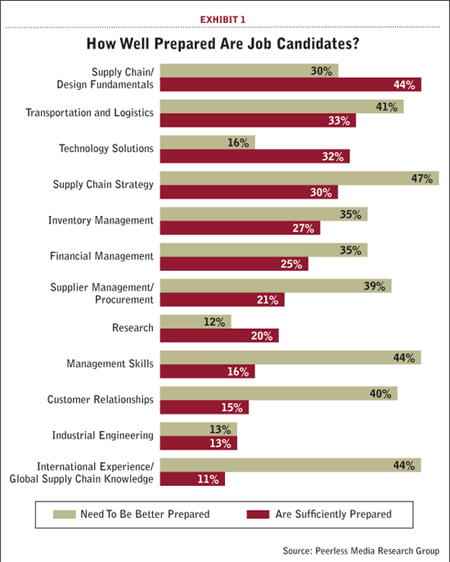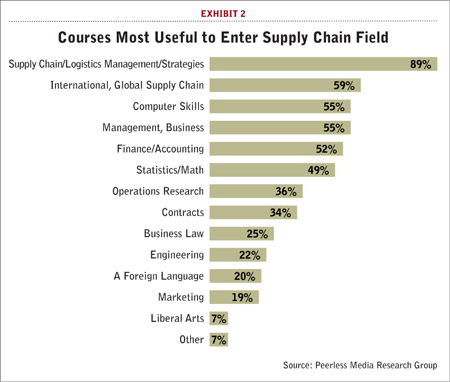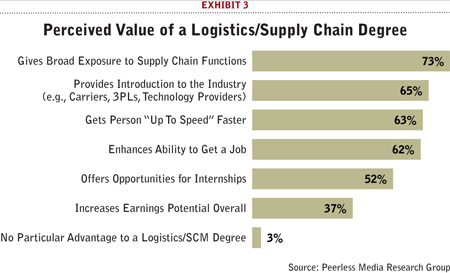To gain a better understanding of what hiring managers think about today’s supply chain and logistics curriculum and educational programs, Supply Chain Management Review and Logistics Management surveyed their readers. The information gathered was used to develop this first annual Hiring Managers’ Evaluation of Universities’ Supply Chain and Logistics Curriculum report.
Conducted by Peerless Media Research Group on behalf of the magazines, the survey looked closely at some of the key issues and trends taking place within the supply chain hiring space right now. When asked whether they had filled any job positions within the last 12 months, or if they were looking to fill any in the upcoming year, fully three quarters of the readers responded affirmatively—a positive economic indicator. The most popular positions that companies are looking to fill included logistics staff positions, supply chain analysts, planner/forecasting professionals, and warehouse/DC workers.
| Education and the Skills Needed to Succeed in Today’s Supply Chain Tuesday, January 31, 2012 | 2:00 p.m. EST Join us for this exclusive Webcast from SCMR as we examine the education and skill sets needed to begin a career in supply chain management and then advance to executive positions.Register now! |
Eighty-two percent of hiring managers said that they have interviewed and hired recent college graduates or are planning to do so. In terms of education levels, the great majority (82 percent) said they were considering candidates with undergraduate degrees, as opposed to advanced degrees. When assessing the competencies that those graduates bring to the table, 69 percent of respondents said that the new and potential hires were best prepared in problem-solving skills. Fifty-eight percent said communication skills were a strong point while 40 percent felt college grads had good IT knowledge.

Hands-On Experience Wanted
At paper distribution firm xpedx in Tampa, Fla., Logistics Manager Bessie McAdams says she’s seen a steady stream of qualified applicants over the last year or so, thanks in large part to the tight job market. When hiring new personnel, she likes to see a mix of educational background and hands-on experience, acknowledging that the latter can prove elusive in the hiring of new graduates.
In particular, McAdams says new hires that either already know how to use the warehouse and logistics equipment—or that are willing to learn it quickly—often make the best managers. “After all, how can you supervise a group of warehouse workers if you don’t know how to use the equipment yourself?” asks McAdams. The manager expects to shift into hiring mode again in early 2012 when xpedx expands its operations into a new area of the state.
Like McAdams, most logistics managers seek out specific skill sets and experience when bringing new graduates onboard. Fifty-eight percent said they want someone with strong communication skills; 40 percent are looking for candidates who are knowledgeable in the latest technologies; 35 percent want relevant technical training; and 33 percent perk up when someone demonstrates some knowledge of industry trends.
When conducting interviews with potential employees, the hiring managers surveyed tend to look for a few specific traits. Eighteen percent said they like to see “confidence, but not arrogance,” with another 18 percent impressed by enthusiasm. Thirteen percent like to see solid communication/interpersonal skills; 12 percent want analytical skills and critical thinking; and 8 percent are seeking candidates with at least some understanding of supply chain basics.
The survey also looked at how well supply chain education prepares job candidates for day-to-day supply chain work. Nine percent said extremely well; 41 percent very well; and 45 percent somewhat. “The industry is complex and fundamentals will enable better growth potential as well as future capability,” wrote one respondent. (Exhibit 1 gives a breakdown of how well candidates are prepared in specific competency areas.)

Supply Chain/Logistics Degree Attractive
Of the positions that hiring managers filled in the past 12 months, 56 percent said they hired recent college grads and 44 percent said they selected other candidates depending on the position. Sixty-six percent of the graduates hired earned logistics/supply chain degrees; 23 percent held engineering degrees; 21 percent had finance/accounting degrees; and 55 percent fell into the category of “other business degree.” (Multiple responses on this question.) Forty-four percent of hiring managers said the candidates were well prepared in supply chain design fundamentals; 33 percent said technology and logistics; and 32 percent felt that IT was a strong point for recent grads.
Most hiring managers (47 percent) felt that candidates need to be better prepared in supply chain strategy. Forty-four percent want to see improved management skills and 40 percent feel that customer relationship management skills need improvement.
| Education and the Skills Needed to Succeed in Today’s Supply Chain Tuesday, January 31, 2012 | 2:00 p.m. EST Join us for this exclusive Webcast from SCMR as we examine the education and skill sets needed to begin a career in supply chain management and then advance to executive positions.Register now! |
“One of the most consistent criticisms of engineering, operations management, and technical career programs is a lack of soft skills,” says D. Brent Smith, associate professor of management and psychology at Rice University’s Jesse H. Jones Graduate School of Business. “The technical competency helps graduates secure jobs. But it doesn’t take long to pick up on the gaps in basic people management and communication skills, both of which are needed to get the job done.”
Other skills singled out as insufficient among recent graduates included supplier management/procurement, inventory management, and financial management.
Damon R. Willis, logistics supervisor at Zimmer, Inc., a manufacturer of orthopedic devices, dental implants, and surgical products, says supply chain and logistics graduates are often well versed in “book” knowledge, but lack real-world expertise.
A graduate of the American Military University and the University of Memphis’ supply chain program, Willis says most of the new hires he sees are strong in supply chain technology (such as WMS, TMS, and related systems) and knowledgeable about lean manufacturing concepts.
“What they really seem to be lacking—myself included when I first graduated—is practical supply chain knowledge,” says Willis, who points to inventory accuracy and material handling best practices as two areas where new hires could use more experience. “Unfortunately these are skills you can’t pick up in school unless you do an internship or gain hands-on experience some other way.”
In fact, Willis sees internships as a particularly effective way to teach supply chain professionals the practical knowledge that they need to succeed in the field. “When I was in college it would have helped a lot if I had the chance to intern for a 3PL firm, for example, and learn the supply chain from front to back,” Willis explains. “Then I would have been able to take that practical knowledge, combine it with my education and graduate as a well-rounded supply chain professional.”
Identifying Useful Skills
When asked what course(s) they felt would be most useful for a college graduate entering the supply chain job market, 89 percent said supply chain logistics/strategies, 59 percent international/global exposure, and 55 percent computer skills. (Exhibit 2 gives the complete listing.) About half of respondents expressed concern over a lack of “people skills” development in graduates and half also said that candidates need greater exposure to business and personal aspects of other cultures.

Responding to the question of the relative usefulness of a degree in logistics/supply chain management for professionals working in the field, close to three quarters (73 percent) of respondents said that such a degree gives broad exposure to supply chain functions. Sixty-five percent said it provides an introduction to the industry (e.g., carriers, 3PLs, technology providers), and 63 percent said a degree gets a person “up to speed” faster than the non-degreed professional. (See Exhibit 3.)
Asked what universities they felt offered high quality supply chain education, respondents mentioned 75 different schools, reflective of the growing popularity of this business discipline. Eight schools received more than 10 mentions each: Michigan State, University of Tennessee, Penn State, Ohio State, Georgia Tech, Arizona State, MIT, and University of Michigan.
According to the survey participants, colleges can better equip students who are looking to enter the supply chain field through the following:
- internship opportunities;
- co-op programs that provide real-world experience and interaction with working professionals;
- more hands-on classroom assignments; and
- a curriculum that more directly parallels actual supply chain operations.
Colleges Get Good Rating Overall
Overall, survey respondents gave the universities generally high marks. Fully 88 percent rated supply chain education as good or better. And of that number, 35 percent rated the universities as very good and 7 percent excellent. David Closs, professor and chair of the supply chain management program at Michigan State University’s Eli Broad College of Business, says he’s not surprised by the survey results. In particular, he says frustration over candidates’ lack of on-the-job experience is a fairly common issue.
“Graduates don’t get the experience unless they’ve gone through an internship.” To fill that gap, while addressing other potential improvement areas identified by the survey, Closs says his school strives to expose students to real-life work situations that can’t always be emulated in the classroom or distance-learning environment.
“We’ve developed student groups around engineering, supply chain, packaging, and other functions,” says Closs, “and put them together to develop cross-functional and cross-discipline solutions. This provides a broader perspective and helps to develop a more balanced supply chain professional.” The cross-discipline work is done in the classroom in both a project and team environment where cross-functional teams of students are assigned to company projects. “While doing company projects is not unique, the cross-functional combination with engineering and packaging isn’t common,” says Closs.
The closer that institutions get to achieving that balance, the more satisfied hiring managers will be, according to the survey feedback. “Textbook theory is nice, but generally young people don’t get jobs to apply that learning early in their careers,” said one hiring manager. “I would like to see much more focus on practical applications, hands-on experience, and most importantly—leadership skills.”
SC
MR

Latest Supply Chain News
- AI, virtual reality is bringing experiential learning into the modern age
- Humanoid robots’ place in an intralogistics smart robot strategy
- Tips for CIOs to overcome technology talent acquisition troubles
- There is still work to do to achieve supply chain stability
- Blooming success: The vital role of S&OE in nurturing global supply chains
- More News
Latest Resources

 Explore
Explore
Topics
Latest Supply Chain News
- AI, virtual reality is bringing experiential learning into the modern age
- Humanoid robots’ place in an intralogistics smart robot strategy
- Tips for CIOs to overcome technology talent acquisition troubles
- There is still work to do to achieve supply chain stability
- Blooming success: The vital role of S&OE in nurturing global supply chains
- Supply chain salaries, job satisfaction on the rise
- More latest news
Latest Resources

Subscribe

Supply Chain Management Review delivers the best industry content.

Editors’ Picks




